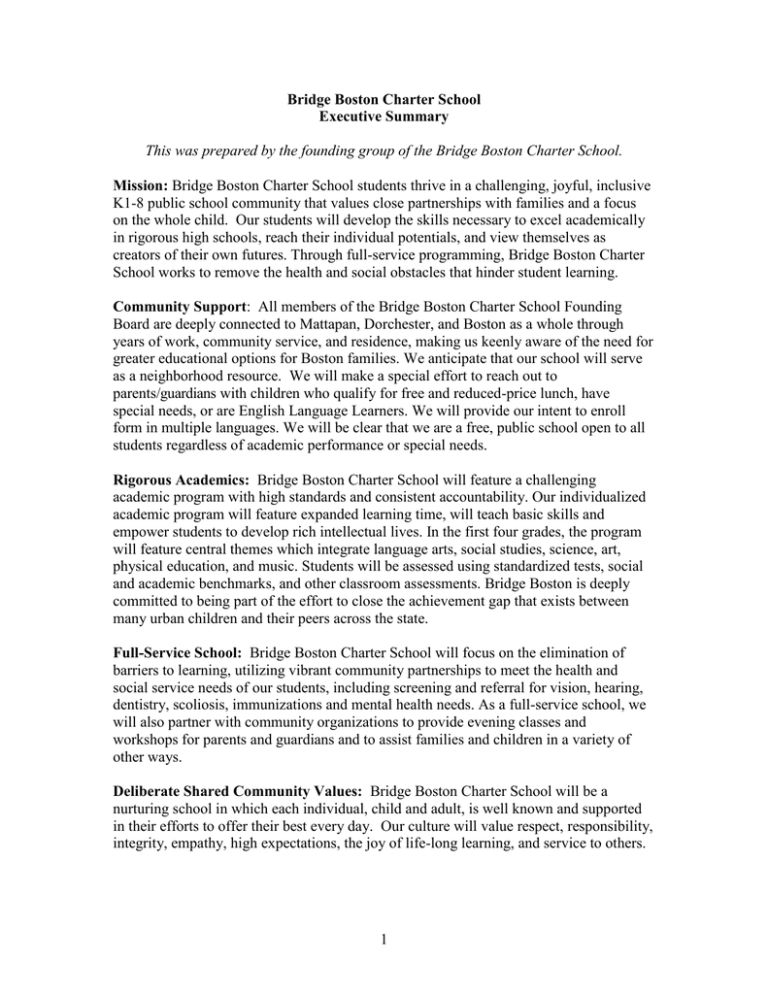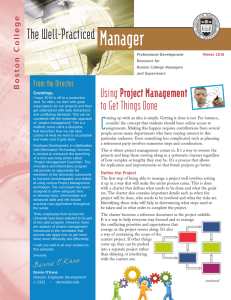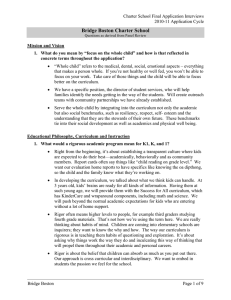item2 bbcs execsum
advertisement

Bridge Boston Charter School Executive Summary This was prepared by the founding group of the Bridge Boston Charter School. Mission: Bridge Boston Charter School students thrive in a challenging, joyful, inclusive K1-8 public school community that values close partnerships with families and a focus on the whole child. Our students will develop the skills necessary to excel academically in rigorous high schools, reach their individual potentials, and view themselves as creators of their own futures. Through full-service programming, Bridge Boston Charter School works to remove the health and social obstacles that hinder student learning. Community Support: All members of the Bridge Boston Charter School Founding Board are deeply connected to Mattapan, Dorchester, and Boston as a whole through years of work, community service, and residence, making us keenly aware of the need for greater educational options for Boston families. We anticipate that our school will serve as a neighborhood resource. We will make a special effort to reach out to parents/guardians with children who qualify for free and reduced-price lunch, have special needs, or are English Language Learners. We will provide our intent to enroll form in multiple languages. We will be clear that we are a free, public school open to all students regardless of academic performance or special needs. Rigorous Academics: Bridge Boston Charter School will feature a challenging academic program with high standards and consistent accountability. Our individualized academic program will feature expanded learning time, will teach basic skills and empower students to develop rich intellectual lives. In the first four grades, the program will feature central themes which integrate language arts, social studies, science, art, physical education, and music. Students will be assessed using standardized tests, social and academic benchmarks, and other classroom assessments. Bridge Boston is deeply committed to being part of the effort to close the achievement gap that exists between many urban children and their peers across the state. Full-Service School: Bridge Boston Charter School will focus on the elimination of barriers to learning, utilizing vibrant community partnerships to meet the health and social service needs of our students, including screening and referral for vision, hearing, dentistry, scoliosis, immunizations and mental health needs. As a full-service school, we will also partner with community organizations to provide evening classes and workshops for parents and guardians and to assist families and children in a variety of other ways. Deliberate Shared Community Values: Bridge Boston Charter School will be a nurturing school in which each individual, child and adult, is well known and supported in their efforts to offer their best every day. Our culture will value respect, responsibility, integrity, empathy, high expectations, the joy of life-long learning, and service to others. 1 Partnerships with Parents and Guardians: We believe that a consistent, close relationship between teachers and families is crucial for the success of students and the school. These relationships will be nourished and respected through close communication and opportunities for parents and guardians to engage meaningfully in the school community through volunteering, visiting, and evening programs. We will ask parents/guardians to hold us to the high standards that we set for ourselves and that we owe to the Commonwealth and to the children in our role as a public school. Teachers will find a collaborative and cohesive shared culture that will help leverage their efforts to improve teaching and learning throughout the school. Enhanced options: Bridge Boston Charter School will enhance the educational options open to children and families because we will: Teach rigorous academic content and set high standards; Provide well-utilized expanded learning time and after-school extended day programs; Offer an innovative and integrated curriculum, including an interdisciplinary focus, central themes, and a rich program in art, music, and physical education; Have deliberate consistent differentiation of instruction to meet each student's individual needs, including a daily class period for additional support or enrichment; Have a vibrant intern teacher program to allow smaller classes, more individual attention for students, and to train future urban educators; Feature a K1-grade 8 format; Include small classes averaging 18 children; Offer full-service programming to meet students' health needs; Include intensive professional development to encourage adoption and replication of best practices; Help place graduates in rigorous high schools at the optimal entry point for each student; Create deliberate community and parent/guardian partnerships, including parent/guardian programs for ESL, GEDs, or financial management; Help develop students’ essential social and emotional skills, knowledge, and awareness. Capacity of Founding Group: The founding group came together through a strong commitment to serve economically disadvantaged children of Boston. About half of our group members have supported the success of Epiphany School in Dorchester, as founders, administrators, teachers, volunteers, and members and presidents of the Board. Epiphany accepts students for its program for grades 5-8 through a lottery open to Boston children eligible for free and reduced-price lunches, with siblings automatically admitted, and 20% of seats reserved for children involved with the Department of Children and Families. Ninety-nine percent of Epiphany students are children of color. Fifty-two percent speak English as a second language and 24% have special needs. Students show 1.7 years of progress, on average, for each year of attendance, as measured by national standardized tests. Attrition and absentee rates are under 5%. Eighty-nine percent of age-appropriate graduates have earned high school diplomas, including one third at independent schools; one third at Boston exam, charter, or pilot schools; and one third at 2 parochial schools. For the three most recent college-ready classes, 72% of graduates are enrolled in college. Epiphany remains in touch with 96% of its alumni and arranged summer internships or jobs for 85% of its graduates who are in high school. A strong intern teacher program further enables individual attention and extended school days. Seventy-seven percent of interns choose to teach urban children as a career. Fully 39% of Epiphany faculty members and top administrators have served since the school opened 12 years ago. The school has extensive community partnerships to provide full-service programming and student enrichment. Epiphany is financially supported by about 1600 donors each year, allowing annual budget surpluses, a schoolhouse and intern house without debt, and a small endowment. The school has been also been supported by many Boston political leaders, is accredited by the National Association of Independent Schools, and has been replicated by more than a dozen schools throughout the United States. Other Founding Board members also share strong ties to Boston and a commitment to urban children. The Founding Board’s 15 members include a cumulative 212 years of Boston residency, 307 years working in Boston, 220 years as educators, and 252 years of service on Boston-area nonprofit boards. A separate 11-person curriculum design team includes 9 elementary school teachers, totaling a cumulative 270 years of teaching experience. Bridge Boston Charter School will have no affiliation whatsoever with Epiphany School and will have a completely separate Board of Trustees, policies, and personnel. (Epiphany School will continue to thrive as a financially sound, independent, successful school under the leadership of its current Head of School, Principal, and Board.) The Bridge Boston Charter School Founding Board seeks to replicate elements of Epiphany's success, but specifically seeks the role of a public charter school, with its accountability and emphasis on dissemination of successful elements that may be replicated by others. This role in the public sector is part of an exciting drive to improve educational opportunities and to build a stronger web of social support for urban children. We also seek to serve younger students when educational growth may be most profound, when self-esteem and academic habits are in formation, and where close family partnerships may serve students over many years. 3




